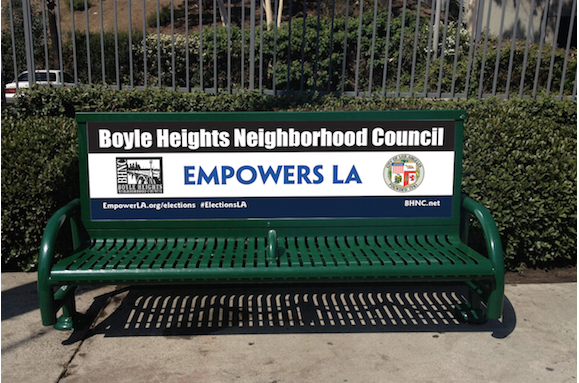CommentsEvery day people living in Los Angeles can take an active role in city government by serving on one of the city’s 96 neighborhood councils, spread out over 12 different regions.
The neighborhood councils are city-certified local groups made up of stakeholders who live, work, own property or have other specific types of connections to a neighborhood. Each is empowered to advocate directly with their councilmember and local authorities on issues affecting their constituents, from planning to transportation to the setting of the city’ budget.
On Saturday, the eight neighborhood councils in Region 8 —Arroyo Seco, Lincoln Heights, Boyle Heights, LA-32 (El Sereno), Cypress Park, Glassell Park, Highland Park, and Eagle Rock — opened the candidate-filing period for people who are interested in being elected to the boards.
Elections are held every two years and the candidate-filing period closes March 22.
Nancy Rosas, president of the Lincoln Heights Neighborhood, which currently has several vacant seats, says members learn to work with the various city departments and programs, and how to communicate with those groups to get services for their neighborhoods.
Each Neighborhood Council has its own set of bilaws and sets its own number of members: Boyle Heights has 16, Eagle Rock 18, and Lincoln Heights has 13.
Created under changes to the city’s Charter in 1999, Neighborhood Councils are supposed to give Angelenos a stronger voice by acting as a liaison between everyday residents and city government.
Candidates for office should be able to commit 10-20 hours per week on Neighborhood Council business; the positions are all voluntary and unpaid. Members are expected to be active in community events, meetings and local special projects.
David Greene, president with the Eagle Rock Neighborhood Council told EGP the neighborhood council system is very important to grassroots movements. He believes Los Angeles has a weak-Mayor system, which means the city is “ostensibly run by the City Council.”
“The opaque funding of Council offices, and the huge size of Council districts, means the very structure of L.A. City government is ripe for cronyism and disparate levels of services…as a result, some neighborhoods seem to benefit from public dollars more than others.”
Neighborhood Councils make it possible for “regular” stakeholders to fight for more opportunities, he said.
“If they’re smart about it, they can weigh the wants and needs of all of their neighborhood’s constituent groups to make better decisions than the City Council itself,” Greene said.
The groups’ decisions, while influential are only advisory, the local councilperson can follow the recommendations or not, and the City Council ultimately has full control of the city’s budget and planning.
Boyle Heights President Vera del Pozo told EGP by getting involved a person can learn how to do community outreach and help resolve issues and problems in their own backyard.
In December, for example, the Highland Park and Eagle Rock neighborhood councils gave a considerable amount of money from their discretionary funds to support the operation of a temporary, emergency homeless shelter at a church in Highland Park.
“Neighborhood Councils can and should be leading the way on issues that are too political or too local for the City Council and Mayor to deal with in a timely way,” said Greene when the Eagle Rock Neighborhood Council gave over $4,000 to help in the homeless issue.
Anyone interested in running for a spot on their local neighborhood council- or learn more about their local council or the system overall, should visit http://empowerla.org/elections/ to find out about the process and registration.
Elections will be held on May 21.
For more questions about the candidate registration process, contact City Clerk by phone at 213-978-0444 during office hours or by email at [email protected].
Sidebar
Our mission is to promote and facilitate civic engagement and neighborhood empowerment, and to hold area government and its politicians accountable.

 CityWatch Los Angeles
Politics. Perspective. Participation.
CityWatch Los Angeles
Politics. Perspective. Participation.
25
Thu, Dec





